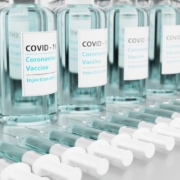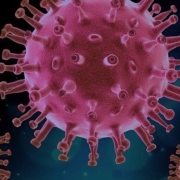Specialized Pro-Resolving Mediators (SPMS) as Potential COVID-19 Therapeutic
April 21, 2022
INTRODUCTION

Our last Perspective described how the timing of the type 1 interferon (IFN) response is a critical early point in determining whether infection with SARS-CoV2 will lead to severe disease or not. IFN activity later in infection, when disease has already developed, is apparently ineffective, and is instead detrimental. Indeed, an overly active inflammatory immune response contributes to severe disease outcome of Covid-19 (and perhaps long Covid). Recent studies have suggested two phases of inflammatory responses after viral infection: an inflammatory phase, followed by a resolution phase, which (beside halting inflammation) involves rebuilding tissue and removing dead cellular debris. A failure of this process can result in inflammatory disease (Post-resolution constitutes a third phase). Anti-inflammatory treatments, such as non-steroidal anti-inflammatory drugs (NSAIDS), do not initiate resolution, although they temporarily tamp down inflammation. This naturally raises the question of whether severe or long Covid-19 might be the outcome of a failure of the resolution phase. Importantly, a proper resolution phase is also required for the priming of adaptive immunity in the post-resolution phase.
RESOLUTION PHASE
The resolution phase depends upon the production and activity of small lipid molecules derived from 3-omega fatty acids, which are collectively called specialized pro-resolving mediators (SPMs). This is marked by diverse activities, including rapid degradation of inflammatory cytokine mRNA, pro-inflammatory cell death, removal of debris, and macrophage reprogramming. These lipid mediators (LMs) are grouped into four families: lipoxins, resolvins, protectins, and maresins. Different SPMs have different functions. For example, lipoxins a4 and b4 scavenge inflammatory cytokines, affect cellular trafficking, and reprogram macrophages towards a non-inflammatory phenotype. Resolvins D1 and E1 dampen inflammatory signaling. Protectin DX induces apoptosis. Maresins affect cell trafficking and have been shown to mitigate lung injury in mice. A thorough review of SPMs is available . There are also other types of mediators involved in resolution, including peptides and proteins (e.g., galectin and annexin) as well as gaseous mediators (e.g., carbon monoxide, hydrogen sulfide, and nitric oxide). Detailed information can be found in this review paper .
A lack of a proper resolution phase is thought to be a cause of various diseases associated with chronic inflammation. The mechanism for the failure of the resolution phase has not been clearly understood. In general, the failure results in inappropriate and persistent expression of pro-inflammatory molecules, including IL-6, TNF, and INF, similar to what is seen in the progress of severe Covid-19. Currently, it is uncertain whether a dysregulated resolution phase is a determinant of severe Covid-19.
LMS AND SPMS

A recent report analyzed SPM expression levels in healthy people and Covid-19 patients. A gas chromatography was used to assess the levels of different LMs in healthy volunteers and people with mild (WHO category 3-4) or severe (WHO category 5) Covid-19. In this study, most of the LMs that were upregulated in this Covid cohort were SPMs, including maresins, protectins, and resolvins. This suggests the presence of at least some pro-resolution activity. Interestingly, mild Covid-19 patients had a pronouncedly higher expression of SPMs than severe patients. This correlated with higher expression levels of SPM biosynthetic enzymes and SPM receptors; and blood phagocyte activation status in the milder cohort. Expression of SPMs persisted at least 2-3 weeks after symptom resolution. Furthermore, dexamethasone treatment, which has been shown to improve Covid-19 symptoms, resulted in upregulation of SPM and SPM receptor expression. Although the size of this study was relatively small, the results are intriguing. Others have reported generally consistent findings.
CONCLUSION
What might be the insight for the treatment of Covid-19? Could these findings be translated to clinical studies? Parenteral administration of fish oil has been suggested as an adjuvant therapy for Covid-19. A small single-blind randomized placebo-controlled trial has been initiated to evaluate the effect of daily iv administration of omega 3 oils on inflammatory markers and SPM levels. Further, recent studies support SPM as having strong therapeutic potential in the management of COVID-19. Clinical studies have demonstrated the safety of SPMs in humans. Exogenous administration of EPA and DHA (Lovaza) restored the endogenous SPMs levels in coronary artery patients, without any severe adverse events (10). Large scale clinical studies will be required to demonstrate potential use of SPM in COVID-19 therapeutics.
References
- Machado, F.S. and J. Aliberti, Impact of lipoxin-mediated regulation on immune response to infectious disease. Immunol Res, 2006. 35(3): p. 209-18.
- Codagnone, M., et al., Resolvin D1 enhances the resolution of lung inflammation caused by long-term Pseudomonas aeruginosa infection. Mucosal Immunol, 2018. 11(1): p. 35-49.
- Lagarde, M., M. Guichardant, and N. Bernoud-Hubac, Anti-inflammatory and anti-virus potential of poxytrins, especially protectin DX. Biochimie, 2020. 179: p. 281-284.
- Gong, J., et al., Maresin 1 mitigates LPS-induced acute lung injury in mice. Br J Pharmacol, 2014. 171(14): p. 3539-50.
- Fullerton, J.N. and D.W. Gilroy, Resolution of inflammation: a new therapeutic frontier. Nat Rev Drug Discov, 2016. 15(8): p. 551-67.
- Buckley, C.D., et al., The resolution of inflammation. Nat Rev Immunol, 2013. 13(1): p. 59-66.
- Koenis, D.S., et al., Disrupted Resolution Mechanisms Favor Altered Phagocyte Responses in COVID-19. Circ Res, 2021. 129(4): p. e54-e71.
- Schwarz, B., et al., Severe SARS-CoV-2 infection in humans is defined by a shift in the serum lipidome resulting in dysregulation of eicosanoid immune mediators. medRxiv, 2020: p. 2020.07.09.20149849.
- Torrinhas, R., et al., Parenteral fish oil, an adjuvant pharmacotherapy for COVID-19? Nutrition, 2020. 81.
- Balta MG, Papathanasiou E, Christopoulos PF. Specialized pro-resolving mediators as potential regulators of inflammatory macrophage responses in COVID-19. Front Immunol. 2021. 12:632238. doi: 10.3389/fimmu.2021.632238.
Specialized Pro-Resolving Mediators (SPMs) as Potential Covid-19 Therapeutic
April 21, 2022
Introduction
Our last Perspective described how the timing of the type 1 interferon (IFN) response is a critical early point in determining whether infection with SARS-CoV2 will lead to severe disease or not. IFN activity later in infection, when disease has already developed, is apparently ineffective, and is instead detrimental. Indeed, an overly active inflammatory immune response contributes to severe disease outcome of Covid-19 (and perhaps long Covid). Recent studies have suggested two phases of inflammatory responses after viral infection: an inflammatory phase, followed by a resolution phase, which (beside halting inflammation) involves rebuilding tissue and removing dead cellular debris. A failure of this process can result in inflammatory disease (Post-resolution constitutes a third phase). Anti-inflammatory treatments, such as non-steroidal anti-inflammatory drugs (NSAIDS), do not initiate resolution, although they temporarily tamp down inflammation. This naturally raises the question of whether severe or long Covid-19 might be the outcome of a failure of the resolution phase. Importantly, a proper resolution phase is also required for the priming of adaptive immunity in the post-resolution phase.
Resolution Phase
The resolution phase depends upon the production and activity of small lipid molecules derived from 3-omega fatty acids, which are collectively called specialized pro-resolving mediators (SPMs). This is marked by diverse activities, including rapid degradation of inflammatory cytokine mRNA, pro-inflammatory cell death, removal of debris, and macrophage reprogramming. These lipid mediators (LMs) are grouped into four families: lipoxins, resolvins, protectins, and maresins. Different SPMs have different functions. For example, lipoxins a4 and b4 scavenge inflammatory cytokines, affect cellular trafficking, and reprogram macrophages towards a non-inflammatory phenotype. Resolvins D1 and E1 dampen inflammatory signaling. Protectin DX induces apoptosis. Maresins affect cell trafficking and have been shown to mitigate lung injury in mice. A thorough review of SPMs is available . There are also other types of mediators involved in resolution, including peptides and proteins (e.g., galectin and annexin) as well as gaseous mediators (e.g., carbon monoxide, hydrogen sulfide, and nitric oxide). Detailed information can be found in this review paper .
A lack of a proper resolution phase is thought to be a cause of various diseases associated with chronic inflammation. The mechanism for the failure of the resolution phase has not been clearly understood. In general, the failure results in inappropriate and persistent expression of pro-inflammatory molecules, including IL-6, TNF, and INF, similar to what is seen in the progress of severe Covid-19. Currently, it is uncertain whether a dysregulated resolution phase is a determinant of severe Covid-19.
The resolution phase depends upon the production and activity of small lipid molecules derived from 3-omega fatty acids, which are collectively called specialized pro-resolving mediators (SPMs).
A lack of a proper resolution phase is thought to be a cause of various diseases associated with chronic inflammation. The mechanism for the failure of the resolution phase has not been clearly understood.
A recent report analyzed SPM expression levels in healthy people and Covid-19 patients. A gas chromatography was used to assess the levels of different LMs in healthy volunteers and people with mild (WHO category 3-4) or severe (WHO category 5) Covid-19.
LMs and SPMs
A recent report analyzed SPM expression levels in healthy people and Covid-19 patients. A gas chromatography was used to assess the levels of different LMs in healthy volunteers and people with mild (WHO category 3-4) or severe (WHO category 5) Covid-19. In this study, most of the LMs that were upregulated in this Covid cohort were SPMs, including maresins, protectins, and resolvins. This suggests the presence of at least some pro-resolution activity. Interestingly, mild Covid-19 patients had a pronouncedly higher expression of SPMs than severe patients. This correlated with higher expression levels of SPM biosynthetic enzymes and SPM receptors; and blood phagocyte activation status in the milder cohort. Expression of SPMs persisted at least 2-3 weeks after symptom resolution. Furthermore, dexamethasone treatment, which has been shown to improve Covid-19 symptoms, resulted in upregulation of SPM and SPM receptor expression. Although the size of this study was relatively small, the results are intriguing. Others have reported generally consistent findings.
Conclusion
What might be the insight for the treatment of Covid-19? Could these findings be translated to clinical studies? Parenteral administration of fish oil has been suggested as an adjuvant therapy for Covid-19. A small single-blind randomized placebo-controlled trial has been initiated to evaluate the effect of daily iv administration of omega 3 oils on inflammatory markers and SPM levels. Further, recent studies support SPM as having strong therapeutic potential in the management of COVID-19. Clinical studies have demonstrated the safety of SPMs in humans. Exogenous administration of EPA and DHA (Lovaza) restored the endogenous SPMs levels in coronary artery patients, without any severe adverse events (10). Large scale clinical studies will be required to demonstrate potential use of SPM in COVID-19 therapeutics.
References
- Machado, F.S. and J. Aliberti, Impact of lipoxin-mediated regulation on immune response to infectious disease. Immunol Res, 2006. 35(3): p. 209-18.
- Codagnone, M., et al., Resolvin D1 enhances the resolution of lung inflammation caused by long-term Pseudomonas aeruginosa infection. Mucosal Immunol, 2018. 11(1): p. 35-49.
- Lagarde, M., M. Guichardant, and N. Bernoud-Hubac, Anti-inflammatory and anti-virus potential of poxytrins, especially protectin DX. Biochimie, 2020. 179: p. 281-284.
- Gong, J., et al., Maresin 1 mitigates LPS-induced acute lung injury in mice. Br J Pharmacol, 2014. 171(14): p. 3539-50.
- Fullerton, J.N. and D.W. Gilroy, Resolution of inflammation: a new therapeutic frontier. Nat Rev Drug Discov, 2016. 15(8): p. 551-67.
- Buckley, C.D., et al., The resolution of inflammation. Nat Rev Immunol, 2013. 13(1): p. 59-66.
- Koenis, D.S., et al., Disrupted Resolution Mechanisms Favor Altered Phagocyte Responses in COVID-19. Circ Res, 2021. 129(4): p. e54-e71.
- Schwarz, B., et al., Severe SARS-CoV-2 infection in humans is defined by a shift in the serum lipidome resulting in dysregulation of eicosanoid immune mediators. medRxiv, 2020: p. 2020.07.09.20149849.
- Torrinhas, R., et al., Parenteral fish oil, an adjuvant pharmacotherapy for COVID-19? Nutrition, 2020. 81.
- Balta MG, Papathanasiou E, Christopoulos PF. Specialized pro-resolving mediators as potential regulators of inflammatory macrophage responses in COVID-19. Front Immunol. 2021. 12:632238. doi: 10.3389/fimmu.2021.632238.
